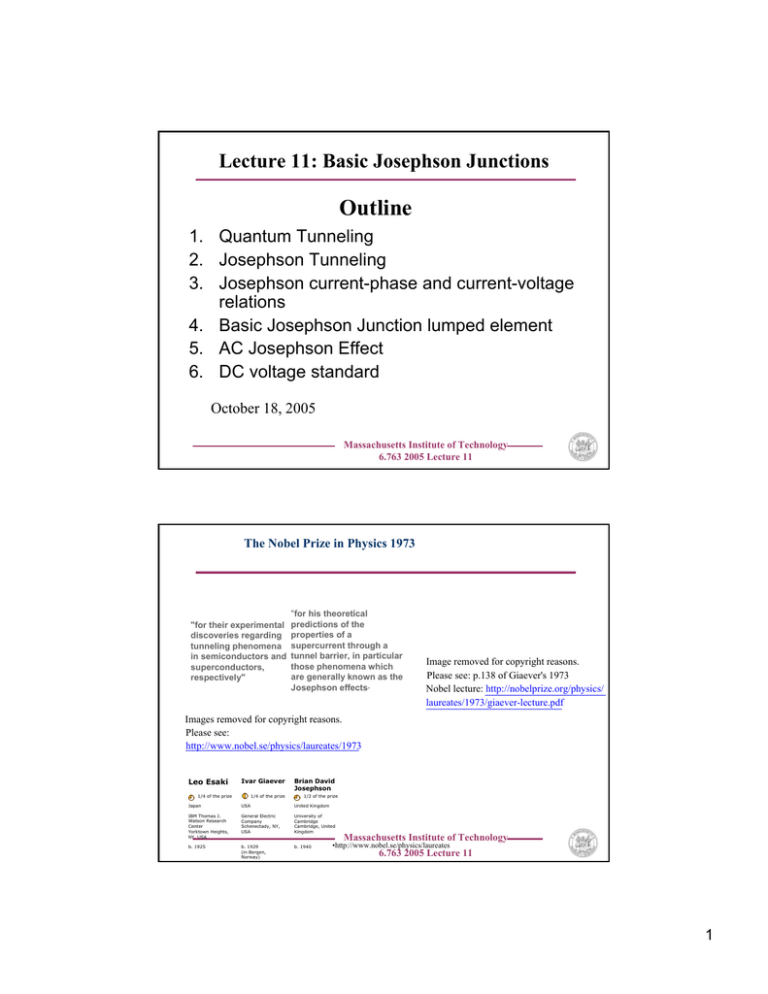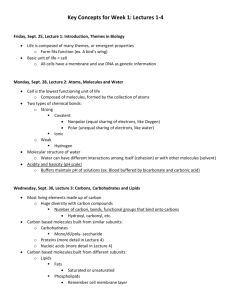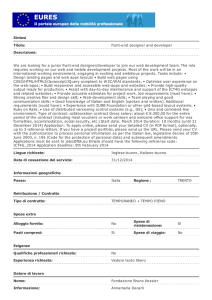Outline Lecture 11: Basic Josephson Junctions
advertisement

Lecture 11: Basic Josephson Junctions Outline 1. Quantum Tunneling 2. Josephson Tunneling 3. Josephson current-phase and current-voltage relations 4. Basic Josephson Junction lumped element 5. AC Josephson Effect 6. DC voltage standard October 18, 2005 Massachusetts Institute of Technology 6.763 2005 Lecture 11 The Nobel Prize in Physics 1973 "for their experimental discoveries regarding tunneling phenomena in semiconductors and superconductors, respectively" "for his theoretical predictions of the properties of a supercurrent through a tunnel barrier, in particular those phenomena which are generally known as the Josephson effects" Image removed for copyright reasons. Please see: p.138 of Giaever's 1973 http://nobelprize.org/physics/ Nobel lecture: ________________ laureates/1973/giaever-lecture.pdf __________________ Images removed for copyright reasons. Please see: _______________________ http://www.nobel.se/physics/laureates/1973 Leo Esaki Ivar Giaever 1/4 of the prize 1/4 of the prize Brian David Josephson 1/2 of the prize Japan USA United Kingdom IBM Thomas J. Watson Research Center Yorktown Heights, NY, USA General Electric Company Schenectady, NY, USA University of Cambridge Cambridge, United Kingdom b. 1925 b. 1929 (in Bergen, Norway) b. 1940 Massachusetts Institute of Technology •http://www.nobel.se/physics/laureates 6.763 2005 Lecture 11 1 Tunneling between a normal metal and another normal metal or a superconductor Image removed for copyright reasons. Please see: p. 140 of Giaever's 1973 Nobel lecture: http://nobelprize.org/physics/laureates/1973/giaever-lecture.pdf __________________________________ Image removed for copyright reasons. Please see: p. 142 of Giaever's 1973 Nobel lecture: http://nobelprize.org/physics/laureates/1973/giaever-lecture.pdf __________________________________ Massachusetts Institute of Technology 6.763 2005 Lecture 11 http://www.nobel.se/physics/laureates/1973/giaever-lecture.pdf Tunneling between two superconductors Image removed for copyright reasons. Please see: p. 148 of Giaever's 1973 Nobel lecture: http://nobelprize.org/physics/laureates/1973/giaever-lecture.pdf __________________________________ Image removed for copyright reasons. Massachusetts Institute of Technology 6.763 2005 Lecture 11 2 Tunneling Summary: We are only concerned with the Josephson Tunneling in a Basic Junction Image removed for copyright reasons. Please see: Figure 8.1, page 394, from Orlando, T., and K. Delin. Foundations of Applied Superconductivity. Reading, MA: Addison-Wesley, 1991. ISBN: 0201183234. Image removed for copyright reasons. Image removed for copyright reasons. Please see: Figure 8.2, page 395, from Orlando, T., and K. Delin. Foundations of Applied Superconductivity. Reading, MA: Addison-Wesley, 1991. ISBN: 0201183234. Please see: Figure 8.3, page 396, from Orlando, T., and K. Delin. Foundations of Applied Superconductivity. Reading, MA: Addison-Wesley, 1991. ISBN: 0201183234. Massachusetts Institute of Technology 6.763 2005 Lecture 11 In the superconducting electrodes: The Supercurrent Equations govern the electrodes, Image removed for copyright reasons. Please see: Figure 8.4, page 399, from Orlando, T., and K. Delin. Foundations of Applied Superconductivity. Reading, MA: Addison-Wesley, 1991. ISBN: 0201183234. Even in the absence of E&M fields, a gradient of the phase can cause a current and the time change of that phase can cause a voltage. For example, for a constant current Jo, at the boundaries we find & So that the wavefunction in the electrode is Massachusetts Institute of Technology 6.763 2005 Lecture 11 3 In the insulator Image removed for copyright reasons. Please see: Figure 8.4, page 399, from Orlando, T., and K. Delin. Foundations of Applied Superconductivity. Reading, MA: The current must be continuous, so it must flux through the insulating barrier; a process which is not allowed classically. But quantum mechanically the superelectrons can tunnel through the insulating barrier as a supecurrent with zero voltage. This is the Josephson current. Addison-Wesley, 1991. ISBN: 0201183234. Because the supercurrent equation does not hold in the insulating region, the full macroscopic wave equation must be used to find Y in the insulating region, with the boundary conditions given by the wavefunction at the electrodes. Tunneling Potential Barrier Massachusetts Institute of Technology 6.763 2005 Lecture 11 Tunneling through the Barrier The energy of the superelectron is less than the barrier height, so that no classical particles flow. Image removed for copyright reasons. constant Please see: Figure 8.5, page 400, from Orlando, T., and K. Delin. Foundations of Applied Superconductivity. Reading, MA: Addison-Wesley, 1991. ISBN: 0201183234. Therefore, in the insulating region Where so that Massachusetts Institute of Technology 6.763 2005 Lecture 11 4 Tunneling through the Barrier At the boundaries. & Image removed for copyright reasons. Please see: Figure 8.5, page 400, from Orlando, T., and K. Delin. Foundations of Applied Superconductivity. Reading, MA: So that Addison-Wesley, 1991. ISBN: 0201183234. & Therefore, with Massachusetts Institute of Technology 6.763 2005 Lecture 11 Josephson Current-Phase relation Image removed for copyright reasons. Please see: Figure 8.4, page 399, from Orlando, T., and K. Delin. Foundations of Applied Superconductivity. Reading, MA: Addison-Wesley, 1991. ISBN: 0201183234. In the presence of and electromagnetic field, the Josephson current-phase relation generalizes to where the gauge-invariant phase is defined as Which is invariant under , , Massachusetts Institute of Technology 6.763 2005 Lecture 11 5 Josephson Voltage-Phase relation The gauge-invariant phase is Image removed for copyright reasons. The rate of change of the gauge-invariant phase is Please see: Figure 8.4, page 399, from Orlando, T., and K. Delin. Foundations of Applied Superconductivity. Reading, MA: Addison-Wesley, 1991. ISBN: 0201183234. At the boundary in the electrodes, so that 0 or Therefore, Massachusetts Institute of Technology 6.763 2005 Lecture 11 Basic Lumped Junctions Image removed for copyright reasons. Please see: Figure 8.4, page 399, from Orlando, T., and K. Delin. Foundations of Applied Superconductivity. Reading, MA: Addison-Wesley, 1991. ISBN: 0201183234. Image removed for copyright reasons. Please see: Figure 8.6, page 406, from Orlando, T., and K. Delin. Foundations of Applied Superconductivity. Reading, MA: Addison-Wesley, 1991. ISBN: 0201183234. Ic is the critical current Massachusetts Institute of Technology 6.763 2005 Lecture 11 6 Energy in a Basic Josephson Junction The energy WJ in the basic junction is Image removed for copyright reasons. Please see: Figure 8.6, page 406, from Orlando, T., and K. Delin. Foundations of Applied Superconductivity. Reading, MA: Addison-Wesley, 1991. ISBN: 0201183234. Use the Josephson relations to write as Therefore, Image removed for copyright reasons. Please see: Figure 8.7, page 407, from Orlando, T., and K. Delin. Foundations of Applied Superconductivity. Reading, MA: Addison-Wesley, 1991. ISBN: 0201183234. Massachusetts Institute of Technology 6.763 2005 Lecture 11 AC Josephson Effect The voltage source is DC with v=V0 , so that Vo + The resulting current is ac! The Josephson frequency is A dc voltage of 10 µV causes an oscillation frequency of about 5 GHz, a Josephson microwave oscillator. But with a typical Ic of 1 mA, this oscillator delivers a very small power of the order of 10 nW. Therefore need many synchronous oscillators. Massachusetts Institute of Technology 6.763 2005 Lecture 11 7 AC and DC voltage drives Let + v(t) - Then the guage-invariant phase is The current is FM-like: Use the Fourier-Bessel series to express the current as a Fourier series A dc current will occur when 2πfJ = n ωs , that is, Massachusetts Institute of Technology 6.763 2005 Lecture 11 Principle of the DC Voltage Standard + v(t) - An ac voltage of 1 GHz applied across the junction will give a dc current, at V0= 0 and at dc voltages of integral multiples of 2µV. The principle of the dc Volt: Put 5000 Josephson junctions in series, and apply a fixed frequency, which can be done very accurately, and measure the interval of the resulting dc voltages that occur at precise voltage intervals. Massachusetts Institute of Technology 6.763 2005 Lecture 11 8 Summary: Basic Josephson Junction (I<Ic) Ψ1 = n1eiθ Superconductor Nb Ψ2 = n2 e 1 iθ Insulator ~10Å, Al2O3 2 • Josephson relations: • Behaves as a nonlinear inductor: I = I c sin ϕ V = LJ V= Φ 0 dϕ 2π dt ϕ = θ 2 − θ1 2π − Φ0 where 1 ∫ 2 r r A( r , t ) ⋅ d l LJ = dI , dt Φ0 2π I c cos ϕ Φ 0 = flux quantum 483.6 GHz / mV Massachusetts Institute of Technology 6.763 2005 Lecture 11 9

